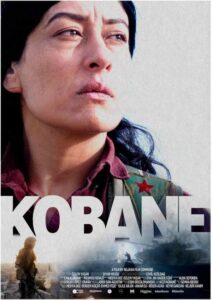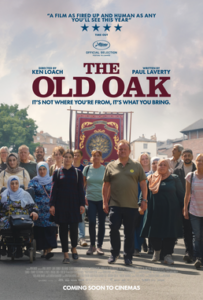The pandemic of crises that nationalistic hostility and capitalism unfailingly deliver is seemingly intensifying. While the asymmetric Israel-Palestine conflict is currently the most prominent flashpoint, two 2023 films recently screened at the Cube Microplex deal with the global ramifications of the still critical situation in Syria. The action in the Rojava Film Commune’s Kobanê takes place on Syrian soil, featuring a world-changing episode in the conflict whereas, nearer to home, Ken Loach’s The Old Oak dramatises the impact of the Syrian Civil War at a remove, upon a working-class community in north-east England.
Directed by Özlem Yaşar, Kobanê deals with the 2014-2015 defence of the eponymous Kurdish city, at that time facing an onslaught from the seemingly invincible advance of the ascendent Islamic State and perilously situated on the border with hostile Turkey. Through the film we experience the Kurdish militias’ triumph in breaking the siege and eventually defeating Islamic State. This represented a significant reversal of fortunes for the Islamist terror group, leading to further liberation and the end of the territorial hold of the so-called “Caliphate”. This has been one of the great “good news” stories of our generation. Due to sensitivities regarding NATO-member Turkey, however, mention of Rojava (now officially known as the Autonomous Administration of North and East Syria) has been largely absent from mainstream reports. Kobanê helps to address this silence. The film is far from silent and reminiscent of Gillo Pontecorvo’s 1966 classic The Battle of Algiers, with its fast-paced depiction of street-to-street urban combat. Yet the sporadic cacophony is adeptly balanced with contrastingly charged, often tense, interludes, though sometimes with moments more meditative. These tell the human stories of the real-life women and men who took up arms to defend not only bricks and mortar but a powerful set of ideas.
We are told in the opening contextual captions that, liberating themselves from the dictatorship of the Assad regime and then under attack from Islamic State, “the people of Kobanê had declared autonomy based on grassroots democracy, ecology, and women’s liberation.” Never have such ideas and ideals been more relevant and necessary. Under the over-arching model of democratic confederalism, the Kurdish Freedom Movement has been advocating an inclusive system of multi-ethnic direct democracy throughout the Middle East and beyond, as an internationalist alternative to the prevailing systems of violence and repression. Yet, in a major escalation since 5th October 2023, Turkey has launched a major new wave of attacks across North-East Syria including Kobanê, with air strikes killing internal security forces and civilians, and destroying much of the water and energy infrastructure. Nevertheless, alongside the suffering and repression, the peoples of the near and Middle East also daily demonstrate astonishing resilience. The model of democratic confederalism defended in Kobanê values the cultural contributions by, and seeks the participation of, all multiple ethnic groups in the wider region, including but not limited to Arabs, Jews, Armenians, Christians, Yazidis, Turkmen, Assyrians, Persians, Baloch, Azeris, and, of course, Kurds.
Perhaps it is this heady combination of the human values of solidarity and liberation that bridges Kobanê to the very different setting of The Old Oak. Topical as ever, it deals with the twin themes of the arrival of Syrian refugees rehoused in a former mining village in Durham, and the still raw legacy of the 1984-1985 miners’ strike. Like the resistance fighters of Kobanê, the sympathetic characters that people The Old Oak are those that are defined by their positive motivations and what they strive for, as much as the injustices they struggle against. The central theme hinges around a developing friendship between articulate Syrian photographer Yara (Ebla Mari) and the local pub landlord T.J. Ballantyne (Dave Turner). While Yara is a traumatised survivor of war-torn Damascus, T.J. is also an embodiment of conflict. Troubled by bouts of extreme depression, he is torn between his sympathies for the newcomers and his battle to keep The Old Oak open, as the community’s only remaining pub. This is dependent upon the custom of his regular drinkers, several of whom increasingly express hostility and racism towards the refugees. Most critical is the rift with his old friend, Charlie (Trevor Fox), one-time comrade during the Miner’s Strike, now the voice of anti-immigration sentiment. Critics may object that the refugees’ trauma is too easily assuaged, and that the resolution is perhaps too smooth.
Yet, at this political moment we don’t need fatalism to goad us into action, but representations of solidarity and hope to inspire us. Both are delivered in Kobanê and The Old Oak. These are stories of friendship, and the comradeship captured in the Kurdish concept of hevalty. Mining communities experienced the necessity for wider solidarity to defend communities; it is realistic that this awareness can surpass the kind of routine xenophobia that Loach’s film challenges. Together with Sally El Hosaini’s The Swimmers, a 2022 film also dealing with Syrian refugees, Kobanê and The Old Oak remind us that our interests and fates are deeply entwined across borders, despite the fatuous “stop the boats” mentality that keeps us weak and divided. They are a refusal of the dynamics of dispossession, enclosure, extraction, and exclusion that are displacing millions of people globally through war, repression, and ecological destruction. We have seen too that instability in the Middle East, fuelled by wider geopolitical complicity, and fuelled by arms proliferation, continually rebounds.
Previous rumours of Ken Loach’s last film have proven to be unfounded, but if the tough but heartwarming Old Oak signals retirement it would enable him to bow out at the top of his game. Watch together and stick together.
The Bristol Kurdistan Solidarity Network arranged the screening of Kobanê to raise funds for the emergency charity Heyva Sor a Kudistane (Kurdistan Red Crescent).
The screening of The Old Oak was put on in collaboration with Save the Rhubarb, the campaign to revive the last pub in Barton Hill.

